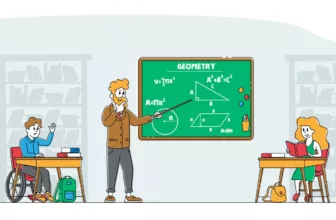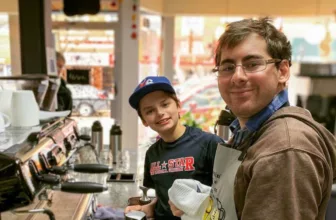
Making the decision to go to grad school is not one to be taken lightly under any circumstance. But doing so as a person with a physical disability can be especially difficult to decipher. While I received academic support on applying to graduate programs from countless mentors, it would have been incredibly useful to have some guidance on how to do so successfully from a disability perspective. Scouring the Internet, the scarce resources I found on this subject were message threads and pages by universities outlining the accommodations they provide their students, but no formalized guide on how people with disabilities personally strategized their way through the process. The following is meant to decode the STEM Ph.D.* program application, providing some tips on how to apply to graduate school with a disability.
* While the majority of this article is written with the Ph.D. in mind, there is some degree of generalizability that applies to many doctorate degrees (at least at the level discussed here).
Meet the Contributors
Raisa Rahim is a fifth-year Ph.D. candidate and National Science Foundation Graduate Research Fellowship Program (NSF GRFP) fellow, studying cognitive neuroscience at University of California, Davis. After having a stroke, she uses a power wheelchair and has a speech disability. She is committed to enhancing the principles of diversity, equity and inclusion in academia and beyond through effective science communication.
Yannis Tevissen is a 25-year-old French engineer. He graduated from Telecom SudParis in 2020. He is now preparing a Ph.D. in AI speech technologies at the Polytechnical Institute of Paris in partnership with the company Newsbridge. Yannis has spinal muscular atrophy, a motor disability affecting his strength and movements.
H'Sien Hayward, Ph.D. obtained her doctorate in psychology at Harvard University, where she was an NSF GRFP fellow. She then completed a postdoctoral respecialization in clinical psychology at the California School of Professional Psychology in San Francisco, CA. Due to a spinal cord injury that resulted in paralysis from the chest down, she has used a manual wheelchair for nearly 3 decades. She is also dedicated to disability advocacy, speaking at and organizing briefings on ableism at the United Nations and doing humanitarian work in countries such as Mongolia, Costa Rica, Thailand, and Rwanda.
Cara Hrycyk is a third-year student in a Psy.D. program in Clinical Psychology at Northern Arizona University, where she is completing a practicum at an inpatient treatment center for substance use disorders. She is currently serving as student government diversity coordinator. She has a spinal cord injury and is paralyzed from the chest down.
This guide will first give generic advice for any applicant in a normal font, followed by tips outlined by contributors specifically directed toward managing these processes with a physical disability in italics.
Tips for Applying to Graduate School with a Disability
1. Know why you’re applying.
Take some time to reflect on what topic you would like to delve into in grad school. Take stock of your skills, those used in the field you are interested in and strategize how you can bridge the gap between them. Understand the financial implications of pursuing a PhD; though most traditional, full-time programs do offer stipends, this income is not always enough to make ends meet. Weigh your options (academia, industry, etc.) based on your values, needs, and goals.
RR: Recognize what you are physically capable of. This is not to say that you should limit yourself; accommodations can and should be made to make work accessible to all. But try to identify how you can make life easier for yourself. For example, I use a wheelchair and only have function in one arm; though empirical work is relatively difficult for me to do, I focused on building my computer programming and academic writing during my gap years.
CH: If possible, talk with students who are currently in the program you are thinking about applying to in order to find out if it is a good fit for you. It is also helpful to interview or job shadow individuals currently working in the profession that you hope to be in after completing school to make sure it is something you will enjoy.
2. Start preparations early.
There are so many factors to consider when comparing programs – organization is key when applying. Make a list of factors that are important to you, noting which are and are not negotiable. Create a spreadsheet outlining what the program is, its location, labs you are interested in, pros/ cons, etc. based on priorities dictated by your specific situation. Let your letter writers know far in advance that you would like them to recommend you and send them periodic reminders (professors are incredibly busy juggling tasks – make sure the task is not dropped from their to-do list).
RR: In addition to the columns listed above, add one for disability accommodations provided by the university. Though some information can only be gleaned by physically visiting the campus, visiting the university’s student disability resources (even corresponding with a counselor) can get you started in understanding what the institution has to offer. Valuable information on logistics (e.g. building accessibility, program history of accommodations) can be learned from the program director. Scope out what services the community at large has to offer (i.e. accessible public/ private transportation) – this can serve as a good heuristic for the community’s perspective on disability.
YT: When applying, the tricky part is to be aware of the accessibility (or inaccessibility) of the place before applying. You don’t want to over-organize something you might be refused for and yet you have to. It can create a lot of false hope. Every institution should have a clear section of their website designed to answer accessibility questions without needing to further call or meet the persons.
HH: Have a singularity of focus in completing the application process, since there are so many components to it. Make a spreadsheet with important dates: names of PIs you’re interested in, program officers, addresses [for sending in physical materials], when to mail recommendation letters so they are received by the deadline, when to send the GRE scores by [though you should also check if the program even requires this test]. I took it multiple times – which is an even better reason to start early! The application process is an endurance game so keep in mind your original goal.
CH: Ask for more letters of recommendation than you need to avoid possible stress if someone you asked does not write the letter for some reason. Make a list of needed application items and due dates to keep yourself organized.
3. Tailor your application.
The personal and research statements are great ways to show your (professional) personality and way of thinking. Make a cohesive argument between these components about why you are a good fit for the program, tying your personal background into why you are interested in working in the specific program/ lab (depending on whether you are expected to enter a lab from the get-go or do rotations).
RR: Although simply navigating life can be a challenge for people with disabilities, it is important to frame these challenges as the building blocks for resilience. Grad schools want to see that you get going when the going gets tough. Focus on how you persevered beyond the barriers, rather than the barriers themselves. I described my stroke and its poor social aftereffects as inspiration for pursuing further education in cognitive neuroscience.
HH: Disclosure is a big question for people with disabilities. There’s a lot of variability in how open people are in discussing their disability. For me, my disability was an integral part of why I wanted to go to grad school — I was interested in looking at how adversity can [be a catalyst for] growth. Though I don’t think I led my personal statement with it, [I framed my disability] as a source of strength and [a lens to enrich my] perspective as a psychologist.
CH: Relate personal and professional experiences that have impacted you to the program. I did not mention my disability in my personal statement.
4. Get first-hand feedback.
Whether there is a graduate student or a principal investigator (PI) in your lab or you have a mentor from another opportunity who you closely worked with, having people who have been through the processes and know what a successful application looks like is very valuable. Having strong ties with these sources is extremely helpful, as they are full of knowledge and may be aware of opportunities (e.g. funding, lab position availability, insights on particular programs/ PIs, etc.) that you might not be aware of.
RR: Depending on how soon you do this step, it can even reflect nicely on your letter of recommendation (by showing that you are organized and act proactively). Through close mentorship from a graduate student, I learned about the NSF GRFP, which seeks to support scientists from diverse backgrounds; they specifically highlight that they are looking to fund minoritized groups like people with disabilities. Applying to grad school with funding in your wallet boosts your application’s attractiveness, but it is just as valuable to apply to as an early graduate student.
HH: Ask for feedback from the people in your life. If you have access to [people in academia], they can give invaluable input. If you do not, use your general support system; I got editing feedback from my parents.
5. Rock the interview.
Depending on how many schools you get calls for and your school/ workload at the time, the interview season can be a hectic one. Like above, organization is key – put deadlines for arranging transportation, etc. in your spreadsheet. Once you find out who you are being interviewed by, familiarize yourself with their work. Depending on the culture of the program, they may want to pick your brain about the field in general, but it doesn’t hurt to demonstrate your specific knowledge!
RR: With the incredibly busy time, interviewees often are not taking the best care of themselves health-wise. Especially in light of the ongoing COVID-19 pandemic, protect yourself as best you can. While many programs offer a stipend to help interviewees get to the location, check with the program director if they can also include a bonus for a caregiver to travel with you. Similarly, ask if there is a remote option if that is more practical for you.
CH: Research the program you are applying to prior to your interview and make note of any questions you have. Asking specific questions about the program demonstrates to the faculty that you have a genuine interest and provides you with the information you need to decide if the program is right for you. Be on time and wear professional attire. Take care of yourself before the interview – get enough sleep the night before and eat a healthy meal.
Takeaways for Applying to Ph.D. Programs with a Disability
Organization really is everything!
It is so easy for things to get lost in the mix. Suss things out where you can, but don’t go overboard. Perhaps get a broad overview of accessibility in programs you are applying to, but only do a deep dive on those you get interviews for
Have (professional) fun with the process!
Let your personality shine through in your application – programs that do not appreciate your whole self will likely not be environments where you can grow and thrive, both academically and personally. Your application speaks for itself that you fit as an academic into the program. The interview is your time to show that you are a great fit as a person.
Practice self-care.
Each time point in the application process is incredibly emotionally taxing. Celebrate every ‘yes’ that you get. At the same time, practice self-compassion if you get a ‘no’ – there are so many moving parts in who a program accepts, it is not an indication of your value as a scientist. Re-evaluate your needs and strategize how to move forward.
Check out the second part of this series, Graduate School Decoded: How to Navigate the Ph.D. with a Physical Disability.
Image by Milkos via Deposit Photos
Raisa Rahim is a fifth-year Ph.D. candidate and National Science Foundation Graduate Research Fellowship Program (NSF GRFP) fellow, studying cognitive neuroscience at University of California, Davis. After having a stroke, she uses a power wheelchair and has a speech disability. She is committed to enhancing the principles of diversity, equity and inclusion in academia and beyond through effective science communication.







